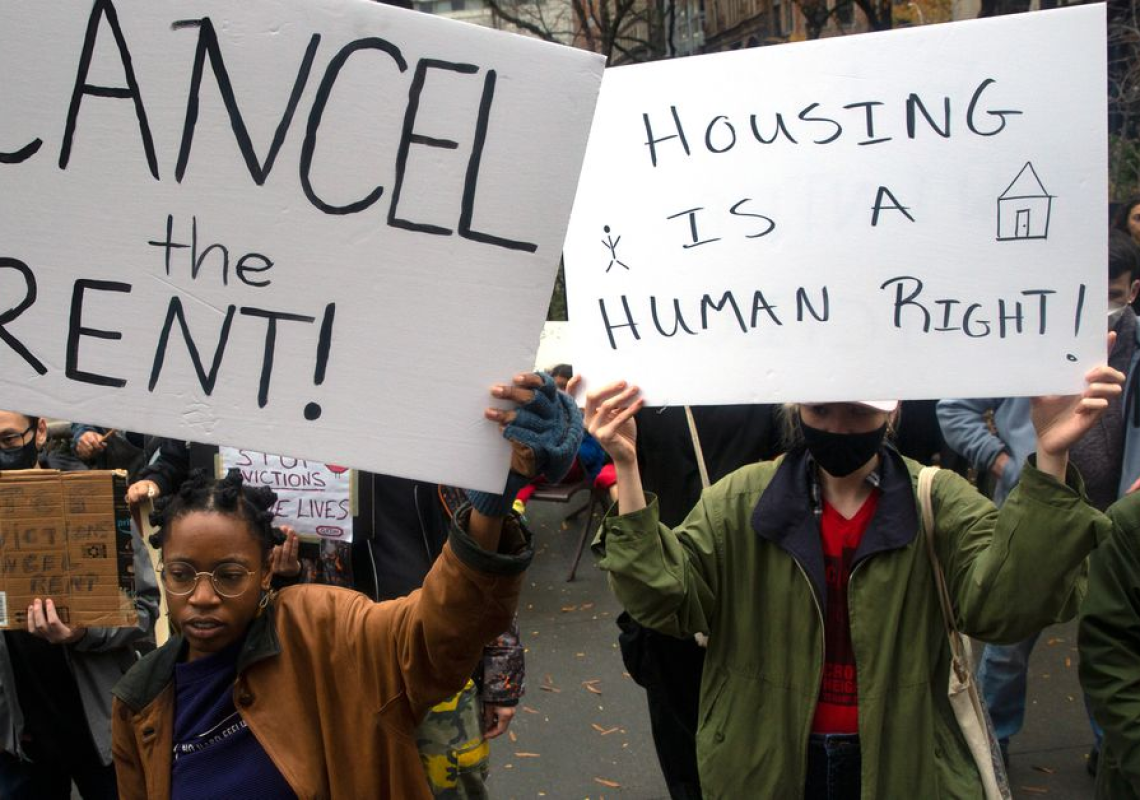Filed under:
With no indication that Albany lawmakers will move to extend the state’s pause on most evictions, New York’s pandemic-era moratorium is set to sunset on Saturday.
That means that the nearly 200,000 city eviction cases against New Yorkers currently pending in Housing Court will begin to move forward once again as early as Tuesday.
Muriel Robbins is among them. The 54-year-old tenant lives in a Pelham Bay apartment with two cats, Garfield and Patchie Poo, and supports herself on Social Security, she said. She got sick in the month before the pandemic, and remained hospitalized for several months as the COVID-19 crisis unfolded, recovering from a ruptured gallbladder and other organ issues, she said.
“I wasn’t thinking straight really, my mind wasn’t focused on anything,” she said. “I lost so much. I was just sick.”
She fell behind on the $154 in rent she owes to her landlord each month; the rest is paid through a Section 8 voucher for her $1,400 unit. She now owes about $3,000 to her landlord of 10 years.
In the fall, he asked her for what she owed. A few weeks later, in November, she got a notice from Bronx Housing Court.
“I told him I didn’t have it, and the next thing I know, the court was getting in contact with me about the eviction,” she told THE CITY.
Robbins has faced homelessness before, previously living in a couples shelter for two years in the late 2000s. Now, she would have to go to one of the city’s shelters for single people, which have a notorious reputation.
“That’s what really got me nervous. I really don’t want to go to the singles shelter,” she said. “I’ll see if anyone in my family would hold my cats for me and, if I have to, I’ll go to the streets before going to the shelter.”
The end of the moratorium means the legal process for evictions will start up again in earnest for thousands of New Yorkers. But that doesn’t mean everyone threatened with eviction in the past two years will be kicked to the curb next week, experts say.
Court proceedings will take a long time to unspool, and there are many resources available to tenants fighting cases or looking for assistance.
Still, it’s a frightening time for those facing eviction, and a wave of New Yorkers is going through it for the first time, said Nakeeb Siddique, director of housing in Brooklyn for the Legal Aid Society,
“Sadly, we have a whole new category of newly downwardly mobile folks who have lost their job and don’t have any means — working people, your cooks, your chefs, cab drivers, all kinds of people — who were never inside of Housing Court,” he said. “They have fallen behind for the first time in their lives, and are facing this abyss.”
Here’s some key information about what the lifting of the eviction moratorium means, and what those affected should do next.
The courts move chronologically, which means the people to be evicted first are likely the people whose housing cases were already coming to an end just as the COVID crisis put a hold on everything in March 2020.
Anyone who received a final judgment and eviction warrant — the last phase of the proceeding — in early 2020 would be the first removed from their homes in 2022, said Jonathan Fox, director of the tenants’ rights unit at the New York Legal Assistance Group.
“We represent plenty of clients who we’ve retained over the course of the pandemic where their case started well before COVID, and the only reason the person wasn’t evicted is because of the pandemic,” he said. “They could have been evicted in March of 2020, but they weren’t, and now they will.”
Second in line are those people who have cases that involve a “wrongful conduct” allegation, said Siddique. That could mean a tenant accused (but not necessarily convicted) of destroying property, or committing violence against another resident.
Then come all the rest, which include more recent eviction cases for nonpayment of rent.
“Everybody else, which is a massive number of people, is third in line,” Siddique said.
According to eviction case data from the Office of Court Administration compiled by the Right to Counsel Coalition and other tenant rights groups, 183,565 residential nonpayment cases are currently pending in the five boroughs. Right before the pandemic, 139,439 such cases were pending.
Eviction processes can be slow, however, and have only slowed further during the pandemic.
Even before the health crisis, Siddique said the pace of court proceedings meant it “was not possible to actually evict somebody in anything less than two or three months from the first court date.”
Now, the timeline will almost certainly be longer: As the backlog of cases has piled up, and virtual court hearings have become common, the process has slowed down.
Leah Goodridge, a housing attorney who represents Robbins, noted virtual courts make things safer when it comes to the coronavirus, but tougher for clients without laptops, phones or broadband web access.
“It’s kind of a Catch-22 — you want to be virtual to be safer, but then there’s also a digital divide,” she said. “For so many people, it’s even more difficult for them to actually engage in their own court proceedings.”
And now that many tenants have free attorneys through the relatively new Right to Counsel law, cases take longer to conclude — which is a good thing for anyone trying to stave off homelessness.
“I honestly don’t understand how Housing Court is going to operate with all of these thousands of cases, that basically weren’t moving forward, that now have to have regular appearances,” said Fox.
Lucian Chalfen, a spokesperson for the Office of Court Administration, said the courts have operated special “gateway parts” in the four largest boroughs for more than a year to put older cases on court calendars, make sure attorneys are appointed, and generally move things along.
“This initiative has not affected the pace of scheduling of older cases,” he said. “Staffing challenges have affected some clerical functions, but not our courtroom operations. Three newly appointed judges will take the bench at the end of this week [Friday], a fourth at the beginning of next month. Calendars will expand accordingly.”
Whether you have court papers in hand or you think you may soon, here’s what to do next according to housing experts.
Don’t move out, said Fox. Getting court papers or an eviction case notice does not equal an immediate order to get out.
In particular, language on a document called a “predicate notice,” which arrives ahead of the start of a Housing Court case, “can be misinterpreted that you have to go,” he said. But “you don’t have to go until there’s a marshal at your door,” he noted.
Don’t give up, said Siddique. His clients often fear that “there’s nothing they can do.” But tenants “absolutely do have due process rights,” he said, and should not treat eviction as inevitable.
Seek professional legal help right away. This is a big one, the attorneys said, and recent statistics following the implementation of Right to Counsel programs bear it out. New Yorkers with low incomes have more access to legal representation than they did before the pandemic. Thanks to the 2017 law, tenants facing eviction in the city can get a free attorney if they make up to 200% of the federal poverty rate, currently about $53,000 a year for a family of four.
Those with higher incomes can get free legal advice through the program, too, though not court representation.
How? Call 311 and ask for the Tenant Helpline or say “right to counsel,” visit HRA’s Right to Counsel portal or, if you are already in court, ask a clerk or court attorney to connect you with a free lawyer, according to the Housing Court website.
Respond to the court. Not responding to Housing Court papers will put you in jeopardy. “Answer your petition and show up in court,” said Siddique. “You can do that nowadays, often, by phoning in the court or participating virtually.”
“Any courts, pandemic or no pandemic, in New York City or anywhere else, they don’t like being ignored,” he said. “When somebody shows up, and they’re actively participating and answering the summons — judges generally like that.”
You do not necessarily need an attorney representing you for an initial answer or appearance, but get one soon after. When you first appear, ask the court staff for a lawyer and they should help connect you to legal services.
Learn about the court process. A great place to start is Housing Court Answers, a nonprofit organization dedicated to demystifying eviction proceedings. They operate a help hotline at 212-962-4795 five days a week, Monday through Friday, from 9 a.m. to 5 pm.
The amount of rent debt owed by New Yorkers in the five boroughs is at least $1.4 billion among more than 407,000 households, according to an analysis of Census Bureau and Treasury Department data by the National Equity Atlas.
Finding a way to fill that gap is still the subject of debate among politicians and advocates at all levels of government.
But there are public resources available to help New Yorkers who are at risk of losing their homes, Siddique said.
“The city, even before the pandemic, has long had the ability and an interest in paying arrears, for those who qualify, to prevent their eviction, and to keep people from becoming homeless and having to go to the shelters,” he said.
Getting public assistance for back rent, like anything, requires lots of paperwork and patience, Siddique said. But here are some options for people who need a financial boost to stay in their homes:
Public assistance from the city’s Human Resources Administration that can be used as a one-time measure by people dealing with a sudden or unexpected crisis, including a pending eviction.
This is a voucher designed to help families on public assistance with children under 18 avoid homelessness. Last month, the governor signed a law boosting the value of the voucher by several hundred dollars per household.
The state created this $2.4 billion fund for tenants harmed by the COVID-19 crisis, using federal dollars. But the pot of money soon dried up, then the state closed the portal to apply.
Because of a lawsuit from the Legal Aid Society, the state recently reopened the portal to apply — but Governor Kathy Hochul warned there is no guarantee applicants will get money. Still, tenant advocates are encouraging New Yorkers to apply because those who do are by law protected from evictions while the state considers their application. Meanwhile, the state and Mayor Eric Adams have urged the federal government to allocate more funding for ERAP.
Yes, though their legal purpose will change after Jan. 15. Hardship declarations are the document in which a resident swears under penalty of perjury that they were unable to pay rent because of a hardship caused by the pandemic.
Tenants who submit them to their landlords before Saturday are protected from eviction only until then.
But even for people who fill them out after that date, they could help bolster future housing cases, Siddique said, and he encouraged tenants coping with nonpayment cases to complete them.
The forms are available in 20 languages through the state court system here.
Sign up and get the latest stories from THE CITY delivered to you each morning
Check your inbox for a welcome email.
Sign up and get the latest stories from THE CITY delivered to you each morning
Check your inbox for a welcome email.
THE CITY is an independent, nonprofit newsroom dedicated to hard-hitting reporting that serves the people of New York. Please consider joining us as a member today.
We’re here to listen. Email tips@thecity.nyc or visit our tips page for other ways to share.
The deadly shoving of Michelle Go in front of an R train on Saturday at the city’s busiest subway station has revived calls for the MTA to install protective shields on train platforms.
Projecting billions in boosted tax revenue and cashing in federal aid, state budget plan socks away funds for a future rainy day while helping New York dig out from COVID calamity.
People in two tiny West Africa towns are stunned by the deaths of sisters, nephews and mothers in a tight-knit immigrant community.
Carlo Scissura agreed to help “friend” Tim Ziss in long battle to control an ailing Astoria development, as city housing officials sought to sell to a new owner. Tenants lament “falling apart” homes.
The pandemic’s emotional strains are falling especially heavy on communities hit hardest by COVID, unemployment and child care challenges.
A worker with the Osborne Association, which provides inmate services on the island jail, was overcome by pepper spray after a terrifying surprise training drill with a correction officer dressed up as an inmate.
Check your inbox for a welcome email.






